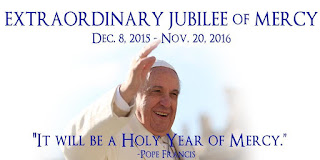Dear Parishioners,
Pope Francis has declared a Jubilee Year of Mercy beginning on the Solemnity of the Immaculate Conception,
December 8, 2015 and ending on the Solemnity
of Christ the King, November 20, 2016.
While we will be hearing more
about this Year of Mercy and the various spiritual events connected to it within
the Diocese of Camden and throughout
the world subsequently, let me give a brief introduction to some concepts here.
A Jubilee Year has roots in both Jewish and Christian
traditions. According to the Book of Leviticus (see Lev. 25: 8-13), a
jubilee year was a time for the Jews when slaves and prisoners would be freed,
debts would be forgiven, and the mercies of God would be particularly manifest. It would typically occur every fifty
years. In our Catholic tradition,
it was in the year 1300 A.D. when we can document that Pope Boniface
VIII first declared a holy year.
Since then ordinary jubilees have generally been celebrated every 25 or
50 years. Extraordinary jubilees also occurred whenever a particular Pope saw
a special need. Many jubilees involve pilgrimages to
a Church or sacred site, frequently within the city of Rome. The forgiveness of sin and God’s mercy are
especially emphasized during this holy year.
Allow me to use some thoughts
from Dr. Robert Stackpole, STD to elucidate
the concept of the Mercy of God. “Divine
Mercy is God's love reaching down to meet the needs and overcome the miseries
of His creatures.” It is much more than
an act of pardon or a cancellation of punishment. Perhaps, it can be seen God’s willingness to
experience and share our suffering and to take measures to remedy it. After all, Jesus and His entire life,
including his willingness to suffer and die for us, reveal the “face of the
Father’s mercy” as Pope Francis has so beautifully described.
We should be familiar with the
Greek Kyrie Eleison (Lord have mercy) as part of our
liturgy. This is a request for God’s mercy to be poured out on us “like holy
oil from above.”
In
the Latin tradition, the principal word for mercy is misericordia, which means, literally "miserable heart."
Father George Kosicki, CSB, the great Divine Mercy evangelist, once summed up
the meaning of this Latin word as follows: misericordia means "having a pain in your heart for the
pains of others, and taking pains to do something about their pain."
The
most comprehensive statement by the Magisterium on the meaning of Divine Mercy
can be found in Pope John Paul II's encyclical letter Dives in Misericordia (Rich
in Mercy, 1981). In that encyclical,
the Holy Father made two very important statements about mercy. First, he wrote, "Mercy is love's
second name." Secondly, he taught that mercy is "the greatest
attribute of God."
I encourage
you to read Pope Francis’ Miseracordiae Vultus and Pope Saint
John Paul II’s Dives in Misericordia to prepare for the upcoming Jubilee Year of Mercy.
Fr.
Ed Namiotka
Pastor



No comments:
Post a Comment